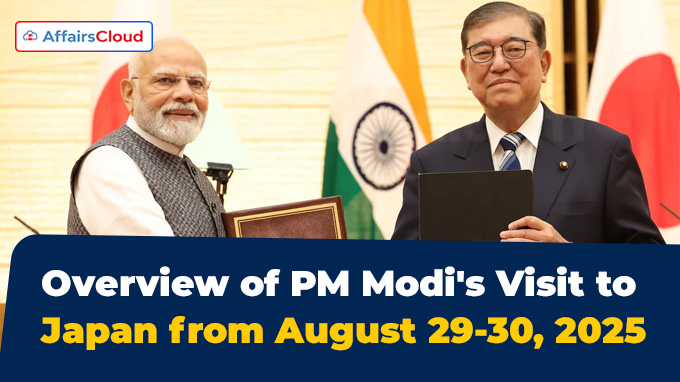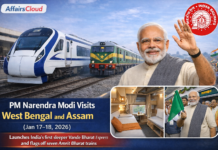 The Prime Minister (PM) of India, Narendra Modi undertook a two-day official visit to Japan from August 29 to 30 2025, at the invitation of Shigeru Ishiba, PM of Japan. This marked PM Modi’s 8th visit to Japan and 1st to attend the 15th India-Japan Annual Summit.
The Prime Minister (PM) of India, Narendra Modi undertook a two-day official visit to Japan from August 29 to 30 2025, at the invitation of Shigeru Ishiba, PM of Japan. This marked PM Modi’s 8th visit to Japan and 1st to attend the 15th India-Japan Annual Summit.
- He arrived at Tokyo International Airport in Tokyo, Japan, where he was received by ONO Keiichi, Japan’s Ambassador to India, and Sibi George, India’s Ambassador to Japan.
Exam Hints:
- What? Overview of PM Modi’s visit to Japan
- Invited by: Japan’s PM Shigeru Ishiba
- 15th India-Japan Annual Summit: Kantei, Tokyo, Japan
- Key Outcomes of Summit: 13 MoUs and agreements and 8 new announcements/launch of initiatives
- New Initiatives: Economic Security Initiative; India-Japan AI Initiative; Next-Generation Mobility Partnership; among others
- 5 Priority Areas outlined by PM Modi: Manufacturing, Technology & Innovation, Green-Energy Transition, Next-Gen Infrastructure, Skill Development, and People-to-People Ties
- Investment Pledged : JPY 10 trillion (in next 10 years)
Key Highlights of the Visit:
India-Japan Economic Forum:
Forum: On August 29 2025, PM Narendra Modi and his Japanese counterpart Shigeru Ishiba attended the India-Japan Economic Forum held in Tokyo.
Organised by: The forum was jointly organised by the Confederation of Indian Industry (CII) and Keidanren, Japan Business Federation.
Key Areas of Cooperation: PM Narendra Modi also outlined 5 key areas to foster greater business collaboration between India and Japan:
- Manufacturing sector: including batteries, robotics, semiconductors, ship-building, and nuclear energy;
- Technology and Innovation: which includes Artificial Intelligence (AI), Quantum Computing, Space and Biotechnology;
- Green-Energy Transition;
- Next-Gen Infrastructure: including mobility, high speed rail and logistics;
- Skill development and People-to-People ties.
12th IJBLF Report: During the forum, the report of 12th India Japan Business Leaders’ Forum (IJBLF) was presented by the co-chairs of IJBLF to leaders of both countries.
Announcement of Key MoUs: During the event, Norihiko Ishiguro, Chairman and Chief Executive Officer (CEO) of Japan External Trade Organisation (JETRO) announced key Business-to-Business (B2B) Memorandums of Understanding (MoUs) signed between Indian and Japanese companies across various sectors such as: steel, Artificial Intelligence (AI), space, education and skills, clean energy and human resource exchanges.
15th India-Japan Annual Summit:
PM Narendra Modi and Japanese PM Shigeru Ishiba attended the 15th India-Japan Annual Summit held at Kantei (Japan), the official resident of Japanese PM.
- Both India and Japan have expanded their Special Strategic and Global Partnership with the signing of 13 MoUs and other agreements covering human resource exchange, environment, digital technologies, space and cultural cooperation.
- PM Narendra Modi has invited Japan’s PM Ishiba, to attend the AI Impact Summit which is scheduled to be hosted by India from February 19-20, 2026.
13 MoUs/Bilateral Documents:
India-Japan Joint Vision for the Next Decade: Leaders of both countries unveiled a comprehensive 10-year roadmap for economic and functional cooperation in 8 key areas of bilateral cooperation: economic partnership, economic security, mobility, ecological sustainability, technology and innovation, health, people-to-people and state-prefecture engagements.
Joint Declaration on Security Cooperation: It is a comprehensive framework, designed to strengthen defense and security cooperation between the two countries to respond to contemporary security challenges in line with Special Strategic and Global Partnership.
Action Plan for India: Both countries signed an action plan aims to promote two-way exchange of 500,000 people between India and Japan, particularly 50,000 skilled and semi-skilled personnel from India to Japan in the next 5 years.
Joint Crediting Mechanism: Both countries signed a MoU on cooperation on joint crediting mechanism, an instrument to facilitate the diffusion of decarbonizing technologies, products, systems, and infrastructure.
- This will contribute to India’s Greenhouse Gas (GHG) emission reduction goals; promote Japanese investment in India and India’s sustainable development.
India-Japan Digital Partnership 2.0: This document aims to boost bilateral collaboration in digital public infrastructure, development of digital talent and joint Research & Development (R&D) in advanced emerging technologies such as: Artificial Intelligence (AI), Internet of Things (IoT), and semiconductors.
Mineral Resources: The MoU in this field aims to accelerate cooperation in supply chain resilience for critical minerals including through the development of processing technologies, joint investments for exploration and mining.
Exchange of Diplomats/Academics: Sushma Swaraj Institute of Foreign Service, India has signed a MoU with the Ministry of Foreign Affairs of Japan, to promote exchanges between diplomats, academics, officials, experts, and researchers to advance mutual understanding in the field of foreign policy.
Environment: This MoU aims to foster collaboration in areas related to environmental preservation such as: pollution control, climate change, waste management, sustainable use of biodiversity and environmental technologies.
Waste Water Management: This MoU aims to promote cooperation in effective reuse of wastewater and decentralized wastewater management.
Collaboration between ISRO & JAXA: Indian space agency, Indian Space and Research Organisation (ISRO) and Japanese space agency, Japan Aerospace Exploration Agency (JAXA) signed an implementing arrangement concerning the joint Lunar Polar Exploration (LUPEX) mission to the south pole of the Moon called Chandrayaan-5.
- The agreement was signed between JAXA’s Vice-President (VP) Matsuura Mayumi and India’s ambassador to Japan Sibi George.
- Chandrayaan-5 will be the 5th mission in India’s Chandrayaan series.
Joint SoI between MoS&T, India and MEXT, Japan: The Ministry of Science and Technology (MoS&T), India has signed a joint Statement of Intent (SoI) with the Ministry of Education, Culture, Sports, Science and Technology (MEXT), Japan, aimed to bolster cooperation in the field of science and technology through the exchange of scientists and researchers, strengthen institutional cooperation between research and scientific institutions of both countries.
Key Outcomes:
Investment: Japan has pledged to raise investments worth Japanese Yen (JPY) 10 trillion (approximately USD 65 billion) into India over the next 10 years.
Economic Security Initiative: Both India and Japan launched the Economic Security Initiative, aimed to promote supply chain resilience in key strategic sectors like: semiconductors, clean energy, telecommunications, pharmaceuticals, critical minerals, and new and emerging technologies.
- They also formally issued an Economic Security Fact Sheet which contains detailed list of actual cooperation in these fields.
India-Japan AI Initiative: This newly launched initiative aims to promote collaboration in Large Language Models (LLMs), training, capacity-building, and support for businesses and start-ups to foster an innovative and trustworthy AI ecosystem.
Next-Generation Mobility Partnership: It is designed to promote Government-to-Government (G2G) and Business-to-Business (B2B) partnerships in sectors like: infrastructure, logistics, and mobility, particularly railways, aviation, roads, shipping and ports, primarily focusing on Make-in-India of mobility products and solutions.
India-Japan SMEs Forum: This new forum aims to bolster collaboration between Indian and Japanese Small, Medium Enterprises (SMEs).
Sustainable Fuel Initiative: It is designed to promote energy security, farmer livelihoods, and advance R&D in technologies related sustainable fuels like: biogas and biofuels.
High-Level Exchanges: Both countries have agreed to high-level exchanges between states and prefectures, including 3 visits in each direction to be organised by the Foreign Offices of respective countries.
Setting-Up of Business Forums: Both countries announced the establishment of business forums between India and two regions of Kansai and Kyushu to bolster business, people-to-people and cultural linkages.
Gifts Exchanged Between Two Countries:
Daruma Doll Gifted to PM Modi: PM Modi was gifted with a traditional Daruma doll by Rev Seishi Hirose, Chief Priest of the Shorinzan Daruma-ji temple, Takasaki Gunma in Tokyo, Japan.
- This hollow, round, Japanese doll is modeled after Indian monk from Kancheepuram (Tamil Nadu, TN) Bodhidharma, founder of the Zen tradition of Buddhism.
Ramen Bowl to Japan’s PM: PM Narendra Modi presented a set of vintage precious stone bowls with silver chopsticks to his Japanese counterpart Ishiba.
- It included a large brown moonstone bowl (sourced from Andhra Pradesh, AP) along with 4 smaller ones, drawing inspiration from Japan’s donburi and soba rituals.
Pashmina Shawl to Spouse of Japan’s PM: He also presented a Kashmiri Pashmina Shawl made from the soft undercoat of the Changthangi goat (found in Ladakh, India) in hand-painted papier mache box to the spouse of Japan’s PM.
About Japan:
Prime Minister (PM) – Shigeru Ishiba
Capital- Tokyo
Currency- Japanese Yen (JPY)




